|
|
|
Sort Order |
|
|
|
Items / Page
|
|
|
|
|
|
|
| Srl | Item |
| 1 |
ID:
112452
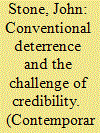

|
|
|
|
|
| Publication |
2012.
|
| Summary/Abstract |
The concept of 'credibility' is a central component of deterrence theory. In this article, credibility is used as a lens through which to examine the effectiveness of conventional force as a deterrent. An advantage that conventional force enjoys over its nuclear counterpart is that it can be used with much greater discrimination. Conventional threats can, therefore, be considered more politically credible than nuclear threats under all but the most extreme circumstances. Conversely, the relatively modest power of conventional weapons renders their effects 'interpretable' to a problematic degree by potential aggressors. Thus, such threats are less likely to be as technically credible as their nuclear equivalents. A range of communicative efforts may serve to reduce the scope for interpreting the effects possible to conventional weapons, although efforts of this kind risk being hampered by cultural obstacles. In consequence, success with conventional deterrence will turn on the ability to identify the specific technical and cultural conditions under which credible threats can readily be made.
|
|
|
|
|
|
|
|
|
|
|
|
|
|
|
|
| 2 |
ID:
112454
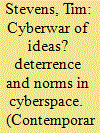

|
|
|
|
|
| Publication |
2012.
|
| Summary/Abstract |
This article relates American efforts to develop strategic 'cyber deterrence' as a means to deter adversarial actions in and through global cyberspace. Thus far, interests- based cyber deterrence theory has failed to translate into effective American policy and strategy, due to a divergence between the operational idiosyncrasies of cyberspace and an over-reliance on Cold War models of deterrence. Even while explicit cyber deterrence strategy falters, the United States is pursuing a normsbased approach to cyber strategy generally, and hopes to derive deterrent effects from its attempts to broker international agreements pertaining to the 'rules of the road' for the proper and productive use of cyberspace. The United States is not the only norm entrepreneur in this policy space, however, and this article examines how a range of other state and non-state actors are complicating efforts to develop normative regimes that might reduce risks to and from cyberspace. The article concludes that a norms-based approach to cyber deterrence might engender deterrent effects at the state level but is unlikely to do so in the case of 'rogue' states and many non-state actors. States will continue, therefore, to develop punitive deterrence capabilities to respond to these actors.
|
|
|
|
|
|
|
|
|
|
|
|
|
|
|
|
| 3 |
ID:
112453
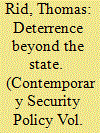

|
|
|
|
|
| Publication |
2012.
|
| Summary/Abstract |
Israel's experience with deterrence is unique: it is older, more diverse, and more experimental than that of any other state. How did Israel's strategy of deterrence evolve? How was it adapted to fit the non-state threat? And what is its utility? This article argues that Israel's experience with deterrence beyond the state can best be understood through the conceptual lenses provided by the other grand deterrence debate, that in the philosophy of law, not international relations. Israel's use of military force against non-state enemies does not fit the classic concepts of strategy. It is not just one act of force to compel one actor to fulfil one specific political goal at one given time; deterrence consists of a series of acts of force to create - and maintain - general norms of behaviour for many political actors over an extended period of time. Using force, consequently, does not represent a principal failure of deterrence but its maintenance through swift, certain, but measured responses. The inquiry concludes by identifying the method's limitations.
|
|
|
|
|
|
|
|
|
|
|
|
|
|
|
|
| 4 |
ID:
112455


|
|
|
|
|
| Publication |
2012.
|
| Summary/Abstract |
This article considers the developing role of deterrence in countering conventional terrorist threats, tracing the post-9/11 rejection and later rediscovery of deterrence as a tool of counter-terrorism. Why do so many policymakers assume that the 'new' terrorism represented such a break with the past? Why was deterrence neglected as a consequence, under the belief that few terrorists do not aspire to be strategic in their campaigns? To the contrary, this analysis shows that most terrorists are open to attempts at coercion and in particular can be influenced by denial-based strategies. In the case of the United Kingdom, denial-based strategies successfully diverted a potentially crippling campaign of economic dislocation in the 1990s, with lessons for today's challenges. A reinvigorated focus on resilience - physical and societal - as part of a denial-based approach to deterring terrorist attacks, particularly those involving home-grown activists, is recommended. This offers the prospect of time and space for broader counter-terrorism programmes of counterradicalization and de-legitimization to run their course and should be part of future counter-terrorism strategies.
|
|
|
|
|
|
|
|
|
|
|
|
|
|
|
|
| 5 |
ID:
112450
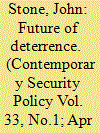

|
|
|
|
|
| Publication |
2012.
|
| Summary/Abstract |
How valuable might deterrence be for managing current and near-future threats to international peace and security? How might it work in such contexts? In 2010 a symposium was held at King's College London in order to address these questions. The participants examined a wide range of issues. A prominent concern was the extent to which the Cold War theory and practice of deterrence remains a valuable stock of relevant experience today. Specific attention was also given to the utility of conventional force as a deterrent, to the prospects for cyber deterrence, and to the feasibility of deterring non-state actors such as terrorist organizations. The participants all considered that deterrence has some role to play in Western strategy and sought to clarify what this might amount to under the specific conditions they examined.
|
|
|
|
|
|
|
|
|
|
|
|
|
|
|
|
| 6 |
ID:
112448
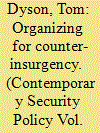

|
|
|
|
|
| Publication |
2012.
|
| Summary/Abstract |
Why do allies not adapt evenly even in time of war? This article maps and explains differentiation in the development of the stabilization and counter-insurgency doctrines of the British and Germanmilitaries during deployment in Afghanistan. In doing so the study analyses the neglected issue of the organizational capabilities of the British and German militaries to develop and apply military doctrine that is appropriate to the exigencies of the contemporary operational environment. Drawing upon documentary analysis and semi-structured interviews, this article uncovers new empirical material on the institutional reforms which have been undertaken to strengthen the adaptability of doctrine and its application in operations. It finds that while the British military's organizational capabilities were characterized by deficits at the tactical level between 2006 and 2009, recent years have seen significant improvement. In contrast, the organizational capabilities of the Germanmilitary remain stunted. While international structure is the main independent variable driving doctrinal adaptability, domestic variables exogenous to the military are the dominant intervening factor determining the development of effective organizational capabilities. Neoclassical realism provides the strongest analytical leverage in understanding the factors determining the capacity of militaries to adapt doctrine to the operational environment.
|
|
|
|
|
|
|
|
|
|
|
|
|
|
|
|
| 7 |
ID:
112447


|
|
|
|
|
| Publication |
2012.
|
| Summary/Abstract |
During the past decade, concerns about energy security have reached levels not witnessed in the developed democracies since the 1970s and early 1980s. In good part because of such concerns, each of the largest of these countries - Britain, France, Germany, Japan, and the United States - has conducted a major review of energy policy, initiated significant policy changes, or both. Also like the 1970s, recent years have seen a variety of proposals for international cooperation to promote energy security. This is where the similarities with the past largely end, however. In contrast to the earlier period, when the principal sources of concern in these countries were high oil prices and uncertain oil supplies, recent worries about energy security have been much more diverse. This paper describes these differences and explores their implications. It argues that the disparities in today's energy security concerns and policy preferences in the major developed democracies are due in part to the divergent policies pursued in response to the oil shocks of the 1970s. It also argues that the present differences will make meaningful cooperation by these countries to promote energy security, which was never easy in the past, yet more difficult.
|
|
|
|
|
|
|
|
|
|
|
|
|
|
|
|
| 8 |
ID:
112451
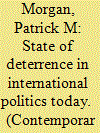

|
|
|
|
|
| Publication |
2012.
|
| Summary/Abstract |
In comparison with the Cold War era, deterrence in international politics has changed significantly, even though many of the basic components of that deterrence still exist and continue to have an impact. Deterrence is now less salient in national security policies and international security management, more recessed, particularly nuclear deterrence. This is primarily due to the huge changes in international politics ushered in by the end of the Cold War, particularly in great-power political relationships, and which are continuing to unfold. Important developments are underway with respect to nuclear deterrence, extended deterrence, collective actor deterrence, and other aspects of international system security. While many old topics pertaining to deterrence continue to be studied and generate continuing controversies, often along the same lines as in the past, some important investigations and theoretical analyses have also emerged on pivotal deterrence, the deterrence of cyberattacks, terrorism, and international crime. What is needed most is analysis on how to develop and apply deterrence strategy and practice in new ways as a central contribution to global and regional system security maintenance and management, a function deterrence performed during the Cold War but in ways now largely out of date. Also needed is careful attention to the possibility of the return of more traditional international politics, particularly if this were to occur in relations among the major states, and careful consideration of how best to use deterrence to hedge against such a development.
|
|
|
|
|
|
|
|
|
|
|
|
|
|
|
|
| 9 |
ID:
112449
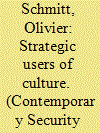

|
|
|
|
|
| Publication |
2012.
|
| Summary/Abstract |
This article looks at cases in which political leaders have engaged in seemingly inconsistent behaviour and explores how they framed and justified their decisions. After showing that strategic culture is composed of different facets, I argue that when faced with conflicting pressures from the international environment and their own national constituencies, political leaders intentionally manipulate facets of their own strategic culture to legitimate a decision, made for contingent reasons, to participate (or not) in a military operation. I illustrate this argument by analysing in depth the decision-making process and public justifications of the German participation in the European and Security Defence Policy (ESDP) mission EUFOR Congo in 2006 and its refusal to militarily participate in a similar mission in Chad in 2007. This conception of strategic culture as both a constraint and a resource for policymakers reinforces our understanding of the boundaries of strategic culture's explanatory power, and provides an explanation of seemingly inconsistent foreign policy behaviours.
|
|
|
|
|
|
|
|
|
|
|
|
|
|
|
|
|
|
|
|
|